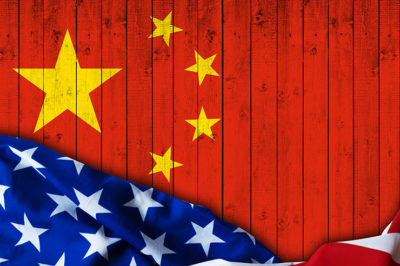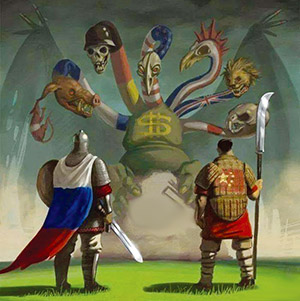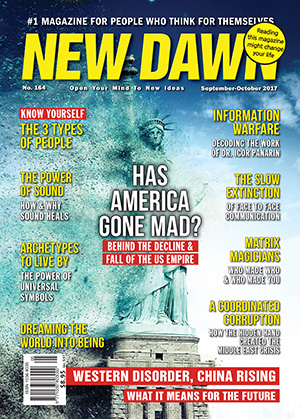From New Dawn 164 (Sept-Oct 2017)
Are we approaching the end of the English speaking world order? asks former Australian diplomat Reg Little (1936-2019). This article, published in 2017, explains the reasons for the current state of affairs and the decline of the so-called “West.”
Western decline is explored on a daily basis by anyone surfing a variety of websites addressing subjects like international finance, global geopolitics, advances in the China Russia partnership, troubles in any of America’s small wars, or technology advances in areas like quantum computing and hyper-sonic missiles.
Even a Pentagon study, “At Our Own Peril: DoD Risk Assessment in a Post-Primacy World,” which appeared in June 2017, explored aspects of the situation. This highlighted the problem as it was part of an effort to further raise the ineffective military spending that has already been a major contributor to US decline. In fact, the study provided evidence of a sense of desperation. Normally, Western political leaders and their mainstream media do their best to render any interest in such matters as evidence of folly and misguided loyalties.
One sentence, randomly encountered in a daily commentary on precious metals, captures much of the widespread sentiment amongst informed observers: Watching America’s “leadership” destroy itself; aided and abetted by a vicious, yet self-immolating mainstream media that has, for all intents and purposes, been re-branded the “fake news,” it’s difficult to have hope for the future.
As America has declined, China has become the world’s largest economy in real terms, the largest trading partner for most nations, the repository of the world’s largest financial reserves, the unrivalled leader in maintaining substantial rapid economic growth, and the pace-setter in critical technology innovation. It is also the leading global strategist, through its use of the Belt and Road initiative (BRI) to restructure the global trading community. This has the potential to marginalise recalcitrant English speaking, maritime nations accustomed to global authority.
Russia, despite inherent differences with its neighbour, has been thrust into a close partnership with China by clumsy and counter-productive Western policies. This has strengthened China’s economic and political position through facilitating access to energy, nurturing an unrivalled defence and technology partnership, and providing an unchallengeable foundation for the BRI, reaching across Eurasia, into Africa, and even commanding attention across vast oceans.
In the past, native speakers of the English language have been privileged in a variety of ways to be at the forefront of unprecedented intellectual, political, economic and technological initiatives for more than three hundred years. These built first a global empire and then aspired to construct a new world order, only today to confront an End of Empire moment.
The challenge posed by the BRI and highlighted by a Beijing meeting, hosted by China’s President Xi Jinping in May 2017, is very poorly appreciated. Its vision of new-tech infrastructure spanning and uniting Eurasia, Africa and beyond represents a fundamental conceptual transformation of the international trading and cultural order. China is at the strategic centre, in terms of infrastructure capacity, financial organisation and technological vision.
The BRI will create many newly empowered multi-lingual and multi-cultural trading communities where the authority of the English language and its associated ways and values will be a fading memory. High-speed rail networks, massive ports and a variety of free trade zones will marginalise the English speaking, maritime people who have shaped the past three centuries, unless they integrate fully.
End of Empire periods are characterised by a major dilemma. Loyalty demands a commitment to the values and actions that have defined the past and the construction of empire. Strategic response and action, in contrast, demands a fundamental re-evaluation of those past values and actions and a readiness to anticipate and manage often unattractive imperatives. As relationships evolve and shift, this is a troubled and confused process. Previously privileged groups find themselves struggling internally to defend accustomed, but fading, powers and privileges.
While the above historical phenomena seems universal, it is best and most copiously recorded in one part of the world. China has extensive written histories, and more recently diverse television series, exploring and evaluating human behaviour in the course of successive rises and falls of dynasties. These offer many insights into the confusing and chaotic trials being experienced in the English speaking world today. The complacent certainties of Manchu aristocrats at the end of the 19th century can seem to foreshadow similar qualities in Wall Street bankers in the early 21st century. In both instances, the comforts and certainties of the recent past inhibit the development of any coherent strategies to manage the challenges of the present and future.
Competing English & Chinese Strategic Wit
Unfortunately, in today’s English speaking world there is neither a similar body of historical experience nor any form of comparable historical record. This allows the Chinese leadership class to oversee Western decline with both passive inaction and superior understanding.
A Western leadership class educated in Chinese classics and history might have remarked that its problems began over seven decades ago. At that time, a conquered and occupied Japan resorted in a highly disciplined manner to utilising a strategy that could be traced back at least as far as the Zhou Dynasty three millennia ago. The Twelve Civil Offensives of the Six Secret Teachings attributed to Jiang Taigong, the major strategist in the founding of the Dynasty, outline a means of conquest through service. A more powerful adversary is made first dependent, then vulnerable, through immaculate service.
Despite a type of Western counter attack against the Asian Economic Miracle with the 1997 Asian Financial Crisis, China and other Asian peoples have been able to continue emulating Japan’s post-1945 example. Even so, no relevant Western leader has remarked on, let alone responded strategically to, this type of disciplined dexterity that turns weakness into strength, when confronted with a more powerful adversary.
This example is but one of many that illustrate the contemporary failings of the English speaking peoples. A mythology has been created around their leadership role in creating a culture of progress. This works to render the past irrelevant and eliminate the need to study the historical experience and wisdom of other peoples. The British historian John Hobson in The Eastern Origins of Western Civilization identified a British practice of “intellectual apartheid,” which mocked and looked down on people who did not share the progressive values of the European Enlightenment.
The folly of this Western culture of progress also elevates a type of financial power and corporate calculation to a form of supreme authority. This is displayed in a major form of criticism levelled against the BRI. This argues that it is difficult to see how many of the projects can produce an acceptable return on capital but neglects to note:
- China’s need to find new markets to replace uncertain, and often declining, Western markets
- China’s need to address economic instability amongst people on its Western borders
- China’s rewards from economic dynamism in its Western regions
- China’s already advanced strategy of becoming the global infrastructure standard setter
- China’s use of BRI as a productive outlet for its reserves of fragile US dollars
- China’s use of BRI to defuse attempts to pressure it geopolitically
- China’s use of BRI to consolidate its important relationship with Russia and other neighbours
- China’s use of BRI to bond with surrounding and distant regions
- China’s use of BRI to assume a central and leading position in global geopolitics
- China’s use of BRI to reduce the power and influence of an often hostile English speaking world
- The neglect, deliberately or otherwise, of these issues by most English language commentators reflects a variety of deep-seated Western vulnerabilities, including:
- Chinese strategic thought and action frequently escape Western recognition
- Chinese strategic action is almost impossible to comprehend using Western corporate values and priorities
- Chinese strategic action exploits a deep mastery of Western thought
- Chinese strategic action can be based on Western ignorance of Chinese thought
- Chinese remember and Westerners forget a century of Chinese humiliation
- Chinese easily master the financial and corporate stereotypes that dictate Western thought
- Chinese classical and historical wisdom has an infinite variety
- Chinese language limits severely Western understanding
- Chinese strategists can count on the untranslatable character of much of their wisdom
Interestingly, a book has just appeared with the title Cracking the China Conundrum: Why Conventional Economic Wisdom Is Wrong.
A Problem for Imperial Legacies
Peoples such as those in what might be termed legacies of empire, like Australia, confront unique challenges during end of empire times. The centres of empire do not want to surrender accustomed privileges, even in distant parts of the world. The outposts of empire are also accustomed to various privileges, even if they are in decline, and can be loath to take the initiative in preparing for a future that promises less favours. Even worse, many habits of thought and behaviour are the product of empire and people have little idea of other possibilities even as these assume a powerful role in distant places. In this situation past habits and practices can continue to rule even when they no longer serve their intended purFor example, people in a country like Australia can continue to believe in the superiority of American and English education, commerce and technology even as evidence mounts that global best practice standards are being set in Japan or China. These sentimental and customary attachments become most difficult to abandon when such an adjustment demands the mastery of a difficult language, an alien way of thinking and challenging forms of community coherence. A review of the Australian Cabinet reveals not one person with any education, experience or interest of significance in a major Asian language, culture or economy.
Not surprisingly, such a leadership community looks constantly to declining centres of empire far from Australia for guidance on how to respond to unfamiliar challenges. Alternatively, it takes guidance from those educated to the standards and habits of thought of those declining centres of empire. These authoritative figures produce guidelines for policy makers with erudite think pieces with headlines in English like “Saving the Global Economic System.” A more appropriate theme would be “The Challenges of Prospering in an Unfamiliar Global Economic System.”
In reality, the English language has become a thought prison for most. They cannot begin to think from the perspective of an emerging Chinese global economic system. Of course, this is no simple matter.
Once out of the education system, few career focused individuals can afford to venture into such a challenging and alien environment. Those who might decide that this cannot be avoided are unlikely to progress far. It will simply be too hard to build a community of like educated and like-minded allies to exercise any influence on the mainstream, to advance a professional career or become more than an irritating critic on the sidelines.
In fact, three decades, from early childhood rote learning of the classics to professional relevance, would be needed to educate a generation of China literate professionals. As a consequence, most of the English speaking world will become ever more dependent on ethnic Chinese native speakers to assume leadership roles in a bewildering environment, best understood from Beijing. This is easily foreseeable and predictable today. This assertion, however, will be bitterly, if ineptly, contested in the English speaking world.
Inevitable economic difficulties and budget funding shortages are already pervasive. These will become increasingly acute, as English language leaders continue to neglect the development of a greater capacity to comprehend the character of Chinese thought culture.
This is transforming the world first constructed by the Honorable English East India Company, under the guidance of its discreet, strategic and knowledgeable financiers. Unfortunately, few English speaking political leaders comprehend in any depth either the financial strategists who have shaped the fading global order or the Chinese strategists who are creating a dynamic new global order.
Today the West’s financial strategists not only support a succession of self-defeating wars but continue to neglect the importance of effective industrial policy and infrastructure maintenance. American infrastructure is in an advanced stage of neglect and disintegration. The Australian Treasurer has just announced plans to spend $10 billion over the next decade on an inland rail upgrade. But this may symbolise Australia’s increasing backwardness in rail efficiency. On completion, it could lag Chinese standards by more than several decades. At a time of imperial decline, the cost of being a legacy of empire takes many forms.
The British Imperial Legacy
Australia, being placed geopolitically and geocommercially in close proximity to, if not as part of, the dynamic Asian region, offers perhaps the most acute study of the dilemmas posed by the legacy of the British empire. Its present government in Canberra displays no evidence of any serious understanding of BRI or other Chinese and Asian dynamics.
It is difficult to avoid the impression that its Ministers are more guided by influences from a fading imperial past than by any understanding of Australia’s geopolitical and geocommercial realities. The nation’s leaders seem restricted to developing policy shaped by ‘information’ from the Murdoch and Fairfax media, which rarely strays from the orthodoxies of mainstream New York media and its financial masters.
In a sense, Australia’s present leadership seems too indolent to explore information from alternative sources or from insights and evaluations shaped by other traditions of thought culture. In many respects, and despite Australia’s geocommercial Asian dependence, Australia’s leaders seem to be little more than modelled on global English language stereotypes. As such they are captives of the disorder that is the contemporary legacy of an English speaking empire or world order.
After some of their predecessors tried but failed to give substance to rhetoric about an Australian Asian future, the present generation of leaders seem resigned to leaving the future to others who will come later. They seem content to limit themselves to managing domestic disappointments as the economy is unnecessarily marginalised in a global order offering fewer and fewer privileges to English speaking peoples. Democratic processes perform poorly in this environment as Ministers mostly come to power with little relevant education or experience and leave power before the consequences of their failings become evident. English language limitations and conventions ensure a minimum of informed criticism of this process, as the maintenance of the mythology of democracy takes priority.
In Australia’s case there is a faint but unnerving echo of the innocence of the Aboriginal people before the arrival of European settlers. Mono-cultural Australian leaders today have little more real understanding of their neighbouring Asian civilisations than earlier settlers had of European civilisation several centuries ago. Yet the imperial certainties that created today’s Australia are now under challenge.
© New Dawn Magazine and the respective author.
For our reproduction notice, click here.




